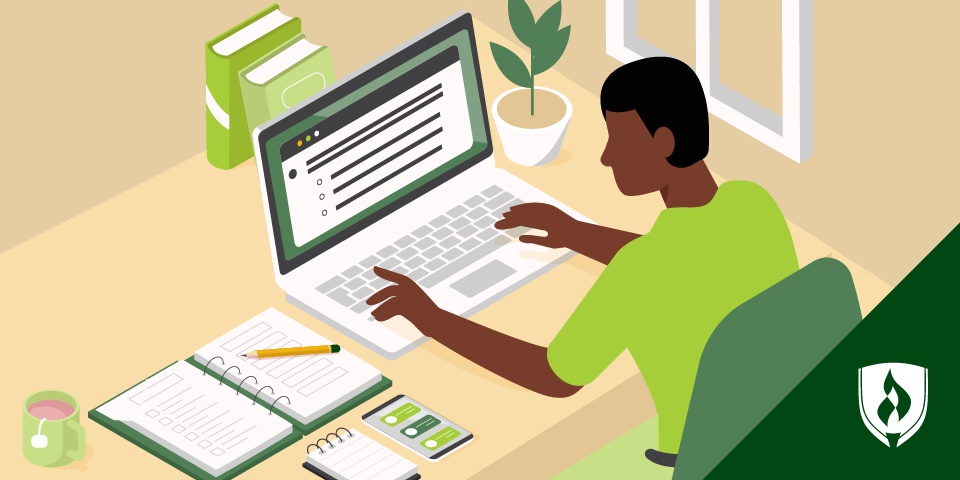
You’re geared up and excited to make the most of your classes this semester. After all, enrolling in college is a smart investment in your future and is the first step on a new career path. Studying hard is one way to protect that investment once classes begin. But with work, family and friends all vying for your attention, you’re worried about falling behind on your coursework.
It takes some effort to juggle your education with your busy life, but having the right study environment can go a long way toward making it easier! We connected with students who have been in your shoes to collect their best study environment tips. Take a look at their advice to see which ideas will work best for you.
7 Study environment tips from students who’ve been there
Consider this firsthand advice from students like you to begin building your perfect learning space.
1. Diminish the distractions
Any environment, even a library, can cause you to lose focus. It all depends on your personal study preferences. Some students find their living spaces too distracting because of chores and other people in the household. Others can’t concentrate if it’s too quiet. They need a little hustle and bustle to focus!
The key is that everyone has different preferences. Identifying your distractors and minimizing them will help you focus on your work. Experiment with background sounds and locations until you find the golden combination that works for you.
2. Develop a study routine
You can’t always control where you study, but you can develop a routine that tells your brain it’s time to get to work no matter what environment you find yourself in. “When jumping from task to task, our bodies and minds have a hard time adjusting. To facilitate faster transitions to get the most out of your time, create a routine that helps you concentrate,” advises Elizabeth Malson, president of the Amslee Institute.
Malson recommends using noise-canceling headphones or soft music, essential oils or candles, a healthy snack and even wearing a “focus hat” with blinders to set the tone for your study session. Whatever you do, the key is to find a ritual that helps you settle in and focus.
3. Don’t go it alone
Sometimes the right environment is more about the people you’re with than where you’re studying. Enlisting help from others can be just the thing that gets more extroverted students in the studying mindset. “Peer study groups are a great environment for sharing ideas and seeking clarification before an exam,” says Tom Blake, a recent university graduate and owner of This Online World.
Set up a weekly study group in the library for your classmates. If you’re taking online classes, create a group study environment using a video call service so your peers can work together remotely. Not only can a standing study date with others increase your accountability, it gives you the opportunity to ask questions and learn from one another.
4. Try a change of scenery
It might be convenient to study at home, but spouses, kids and a pile of dirty laundry can all become distractions that derail your focused study time. Even if you’re the only one home, there’s no denying that your living room couch is more likely to encourage you to watch a streaming service than to hit the books.
A change of scenery could be all it takes to get you back into study mode. A campus library is an obvious choice, but if you’re not located near your school, a public library is a good alternative. If you prefer some background noise while you work, your favorite coffee shop might be ideal. Just don’t forget your headphones in case your fellow coffee drinkers get too loud!
5. Make your studies portable
Students who get creative with taking their studies on the go can find a great study environment in some unlikely places. Read a chapter or watch a lecture during your lunch break at work. Keep study notes on your phone so you can brush up on your facts while sitting in the carpool line, watching baseball practice or stirring dinner.
Commuting to and from work or school can also be an ideal place to study, thanks to technology. “The subway may not be a great place to study but with online classes that can be viewed from your phone, it can work,” says Malson. Those who drive to work can listen to textbooks or lectures on audio.
6. Get a little help from your friends (and family)
“Don’t be afraid to ask friends or family for some of their time to help with your test prep,” Blake says. Rather than avoid your spouse, children or roommates so you can study, invite them to help by quizzing you before a test or discussing points from your latest lecture. “Other people around you can provide valuable feedback, questioning and ideas to help stimulate discussion,” Blake says.
You can even pretend to be the teacher and give your friends or family a crash course on the lesson you’re focusing on. “If you can explain a concept to another person, you understand the subject matter quite strongly,” Blake says.
7. Use technology to your advantage
There’s no denying that technology can be a huge help in completing your coursework. Malson points out that nearly any environment can become a makeshift study room when you have free Wi-Fi hotspots, tablets and smartwatches at hand. Make the most of the technology you already use by downloading relevant e-books and audiobooks, planning your study sessions and tracking assignments with a digital calendar and using study apps to help you prepare for a big test.
But technology is only helpful if you use it the right way. If you find yourself becoming distracted by texts or social media, it’s time to put your phone away, turn off the TV and get down to business. Sometimes going unplugged is the best way to bring focus to your work!
Find your best study environment
These study environment tips should give you some actionable ideas to try the next time you’ve got some serious studying to do. Your ideal study setting is unique to you, so experiment with these ideas until you discover what works best!
Now that you’ve got a plan for where to study, you need to be prepared to tackle your tests with a clear mind. Learn how with our article, “8 Test Anxiety Tips to Help You Stay Calm and Confident.”
EDITOR’S NOTE: This article was original published May 2015. It has since been updated.




